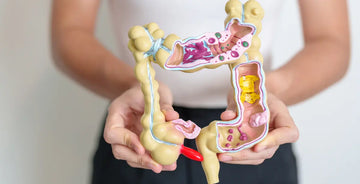Tabla de contenidos
Digestive enzymes: the secret behind good digestion.
If you have ever felt that certain foods are heavy on you, that your digestion slows down or that bloating appears for no apparent reason, it's possible that digestive enzymes are the great forgotten in your digestive health. They are the true protagonists of food breakdown and nutrient absorption. Without them, it doesn't matter what you eat: your body won't be able to make the most of it.
And if, You can be eating super healthy and still have digestive problems if the enzymes aren't doing their job.
Join me to discover what they are, how they work and why they can markr the difference in your well-being digestive.
What are digestive enzymes and why do you need them?
Digestive enzymes are proteins specialized in breaking down food into smaller molecules so the body can absorb and utilize them. They're like tiny "workers" who transform nutrients into building blocks accessible to our cells.
The important thing: Without the proper action of these enzymes, digestion becomes slow and inefficient. Food ferments more than necessary in the intestine, which can lead to bloating, gas or even nutritional deficiencies.
Did you know that…? The human body produces more than 22 types of digestive enzymes, each with a specific function. Some are capable of breaking down proteins into tiny fragments called peptides, while others specialize in breaking long chains of starch into glucose molecules.
Where are digestive enzymes produced?
Digestive enzymes are not produced in one place, but are produced at different key points in the digestive system:
-
Saliva: Digestion begins in the mouth, where amylase begins to break down carbohydrates.
-
Stomach: Key enzymes, such as pepsin, are released here. Help to digest proteins.
-
Pancreas: It is the main organ responsible for producing digestive enzymes, releasing them into the small intestine.
-
Small intestine: Here other enzymes act to complete digestion and prepare the nutrients for absorption, finishing breaking down what was not digested before.
The important thing: Your digestive system produces enzymes at different points, and each has its own function. When any of these stages fails, digestion becomes inefficient and discomfort such as heaviness, bloating or a feeling of food “stuck” in the stomach.
Did you know that…? Digestive enzyme production declines with age, which may explain why some people experience more digestive problems as they get older. Therefore, in certain cases, enzyme supplementation can be a useful tool.
The connection between the nervous system and enzyme production.
Digestion is not just a matter of what you eat, but how and in what state you eat it. The nervous system plays a key role in the production of digestive enzymes. In order for these to be released in sufficient quantity, the parasympathetic system, known as “rest and digest” mode.
What happens if the nervous system is not in balance?
Stress and activation of the sympathetic system (“survival” mode):
-
When we are stressed, the body goes into fight or flight mode, prioritizing energy towards the muscles and brain, reducing blood flow for digestion.
-
The production of stomach acid and digestive enzymes is reduced.
-
Intestinal motility slows down and heavy digestion, constipation or diarrhea may occur. bloating.
“Rest and digest” mode (parasympathetic system activated):
-
The production of acid and digestive enzymes is stimulated.
-
Intestinal motility remains stable.
-
Digestion and absorption of nutrients becomes efficient and painless.
The important thing: eat in calmIt is not a whim, but a biological necessity. If you eat stressed, it won't matter how healthy your food is, because your body literally “shuts down” digestion, it does not release enough enzymes and your digestion suffers.
Did you know that…? Eating while stressed not only affects digestion, but can also affect metabolism and promote abdominal fat accumulation. Another reason to relax before eating!
How to activate the parasympathetic system before eating?
Imagine your body is a race car. If you're accelerating full throttle, the engine roaring and the tires squealing, do you think you could change a tire or perform maintenance without any problems? Difficult, right? The same goes for your digestion. If you eat in "survival" mode, your body can't focus on digesting food properly.
The parasympathetic system is responsible for putting you in "digestion mode," allowing digestive enzymes to do their job efficiently. So, before you dive in, get started with these strategies!
-
Chew your food well → Digestion begins in the mouth. Chewing not only grinds food, but also sends signals to the brain to activate the production of digestive enzymes. The more you chew, the less work you give your stomach and intestines. So, instead of gobbling it up like it's a competition, enjoy every bite!
-
Eat in a quiet environment → If you eat with your phone in your hand, watching the news, or answering work messages, your brain remains on alert and digestion slows down. Spend at least 20-30 minutes eating without distractions, enjoying the flavor and texture of your food. Your digestive system will thank you!
-
Take a deep breath before eating → It may seem silly, but a few deep breaths can work wonders. Inhale through your nose, hold for a few seconds, and exhale slowly. This tells your nervous system that everything is okay, activating "digestion mode" and optimizing the production of digestive enzymes.
-
Avoid rushing → Have you ever felt like you eat so fast you can't even remember the taste of your food? Rushing through the motions not only ruins the eating experience, but it also prevents your body from releasing the enzymes needed to properly digest food. Take your time, savor every bite, and let your body do its work.
Did you know that...? Your nervous system has two main modes: sympathetic (fight or flight) and parasympathetic (rest and digest). When you stress-eat, your body thinks it's escaping a lion and shuts down digestion. So, unless there's an actual lion in your kitchen, relax before eating.
The microbiota and its enzymatic role.
It's not just the pancreas and intestine that produce digestive enzymes. Your gut microbiota also plays a key role in digestion:
-
Some intestinal bacteria Helpna activate and produce certain enzymes, facilitating the digestion of carbohydrates, proteins and fats.
-
Other bacteria influence the production of bile salts, which are necessary to digest and absorb fats well.
-
When the microbiota is out of balance, digestion becomes more difficult and enzymatic processes can be altered, generating more fermentation, bloating and discomfort.
The important thing: Your microbiota directly influences your digestion. Maintaining a proper balance of beneficial bacteria Help to improve the production of digestive enzymes and the absorption of nutrients. If the microbiota is not balanced, digestion will not be either.
Did you know that…? Some people can digest milk without problems thanks to specific bacteria in their microbiota that continue to produce lactase into adulthood. However, for those who lack these bacteria, lactose digestion becomes a problem.
What happens when there are not enough digestive enzymes?
Imagine your digestive system is like a kitchen full of ingredients ready to be transformed into a delicious meal. Now imagine if the chefs in charge of cooking (the digestive enzymes) don't show up or are working half-heartedly. The result? A culinary chaos where food isn't broken down properly, uncooked chunks remain, and the entire process becomes slow and tedious. The same thing happens in your gut when there's a deficiency of digestive enzymes.
When the body doesn't produce enough digestive enzymes, digestion becomes slower and more inefficient. This can cause symptoms such as:
-
bloating and gases after eating, since the food ferments more than it should.
-
Feeling of heaviness, as if the food simply sat in the stomach unprocessed.
-
Discomfort with certain foods, especially fats, proteins or dairy products, which require more effort to be digested.
-
Alterations in intestinal transit, with episodes of constipation or diarrhea.
But the problem doesn't end there.When food is not digested properly, it can cause intestinal inflammation, triggering a vicious cycle of digestive discomfort.
Digestive enzymes and inflammation: the vicious cycle.
If digestion is not carried out correctly, unprocessed food remains in the intestine can:
-
Over-ferment, generating gas and abdominal distension.
-
Alter the intestinal microbiota, favoring the growth of opportunistic bacteria that can cause more digestive problems.
-
Increase intestinal permeability, allowing undigested particles to pass into the bloodstream and trigger unnecessary immune responses.
In other words, a lack of enzymes can lead to poor digestion, which not only affects how you feel after eating but can also lead to long-term metabolic and immune problems.
The important thing: if you notice bloating, gas, heavy digestion, or discomfort with certain foods, your body may be asking for more enzymatic support. Chew well, eat with calma, include enzyme-rich foods and, if necessary, consider a digestive enzyme booster. Your gut and your well-being They will thank you.
Did you know that...? Sharks can take up to a week to digest a single meal, not because their digestion is slow, but because it's optimized to make the most of each bite and space out their meals. In contrast, our digestive system is designed to be faster, but if we lack the right enzymes, digestion becomes inefficient, causing fermentation. bloating and discomfort. A real digestive blockage!
How to improve production natural of digestive enzymes?
1. Chew your food well → The more you chew, the easier it will be for your body to digest food.
2. Eat in a state of calma → Remember that the parasympathetic system has to be activated to release enough enzymes.
3. Include foods rich in enzymes naturalis
-
Pineapple (bromelain)
-
Papaya (papain)
-
Kefir and yogurt natural
-
Sauerkraut and other fermented foods
4. Ensures good stomach acid production → Without enough acid, some enzymes don't activate properly. Taking lemon or apple cider vinegar before meals can Helpr, as long as the gastric mucosa is in good condition.
The important thing: Optimizing digestion is not just a matter of what we eat, but how we process it. Small changes can markr a big difference in your digestion and well-being.
Did you know that…? ANDThe digestion process begins even before eating: just by seeing and smelling food, the brain sends signals to the stomach to begin releasing acid and enzymes.Our body is incredibly well designed!
Conclusion: Digestion begins before food reaches the stomach.
Digestive enzymes are essential for breaking down food and utilizing its nutrients. If they don't work properly, digestion slows down and symptoms such as bloating, gas and heaviness.
The connection between the nervous system, microbiota, and digestive enzymes is key to understanding digestion. Making small adjustments to your diet, environment, and lifestyle can markr a big difference in how we feel after eating.
If you notice that your digestion isn't what it used to be, start paying attention to your body's signals and help it optimize its digestive function!
-------------
Elena Garrido
Comprehensive nutritionist
https://elenagarridonutricion.com/










